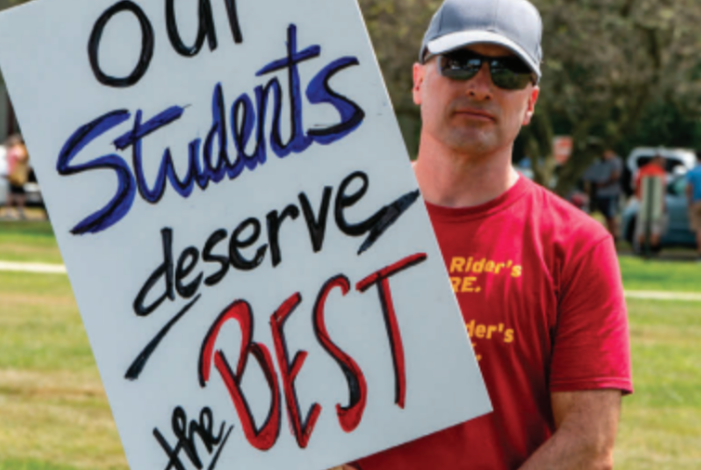
Faculty union welcomes students with informational picket signs
By Amethyst Martinez and Kaitlyn McCormick
Over Labor Day weekend, new and returning students moving onto campus were met by a sea of poster boards and professors during informational picketing by Rider’s chapter of the American Association of University Professors (AAUP), sparked by ongoing contract negotiations between the union and administration.
Around the Campus Mall following the flow of move-in day traffic, faculty and supporters dressed in cranberry and baby blue AAUP shirts, held up picket signs with phrases such as “AAUP preserving Rider for future students,” and, “We don’t want to strike, treat us right,” and handed out informational fliers to students and family informing them of a possible strike. Some faculty also brought their children to the picketing.
“It is important that you know that at this point, years of mismanagement by Rider’s Administration has left the school in a very difficult financial situation,” the flier read in part. “Now, as usual, the Administration would like faculty to pay for its mistakes.”
Students and families were notified of the picketing prior to move-in via an email sent out by the University’s Vice President for Student Affairs, Leanna Fenneberg, which assured recipients in bolded letters that AAUP members were not actively on strike and would continue to coach and teach during their contract extension.
Union reasoning
Philosophy professor Joel Feldman spoke to the Rider News while picketing to illustrate his concern for the university and its professors.
“The whole thing that’s great about Rider is the amount of attention we’re able to give to the individual student. And if you start having four classes per semester instead of three, you can imagine what that’s going to take away from the quality,” Feldman said.
Feldman also said that students can be taught something from seeing the union picket during the move-in days.
“It’s a good learning experience for them, right, to see, you know, how one stands up for oneself and organizes for justice. … People can make a judgment for themselves looking at the proposals on both sides; that’s an important learning experience,” Feldman said.
He added that if he were in the shoes of parents he would be concerned not only about a potential strike, but that the “quality of the education is being hollowed out.”
Head athletic trainer Tim Lengle explained that, although a lot of people may not realize initially, the ongoing negotiations “severely affect the athletics department as much as they do the faculty.”
Lengle said that his biggest concern is that the university needs to “start making some better decisions about where [its] money is going.”
He added that while it is great that more teams and opportunities are being brought in to meet Title IX obligations, the problem is a lot broader.
“You’re adding teams, but you’re not adding medical staff. You’re adding teams but you’re not giving them the appropriate level of coaches. We have teams on this campus, 40, 45 or so kids, that have one coach and one part-time coach that doesn’t get paid very well,” Lengle said. “It’s very difficult to give them the kind of experience that they expect when they come to a division one institution with that level of coaching.”
With a potential strike on the horizon, many have questions about how sporting events may be impacted.
“I know that in the past negotiations, the administration has said that they would coach teams or teams would coach themselves, so they would have captain’s practices and administration would coach games. I think that the big question mark is, ‘Can you hold home events without medical staff?’ And I say no,” Lengle said.
Student athletes were seen supporting their union coaches and trainers, though they were instructed not to speak with the media.
Student and family response
Tania Eaton, the mother of a freshman student, said during Sunday’s move-in that after she received the email about the picketing, she looked up Rider and found a lot of criticism from alumni regarding the handling of Westminster Choir College as well as the pay rates of upper administration, such as President Gregory Dell’Omo.
“It gives you pause,” Eaton said, “and then now you’re sending your daughter here.” Eaton continued that her hope is that both parties are able to reach a “happy and equitable” agreement.
Scott Eaton, the student’s father, also added that the family’s “main concern” was that students’ education and sports programs wouldn’t be interrupted.
“We just wrote a massive check,” he said.
Other parents seemed more off-put by the demonstration. One mother of a returning sophomore, who requested to remain anonymous, regarded the picketing as “inappropriate.”
“It’s not like the kids have a say in any of that,” she said.
Some returning students, like junior actuarial science major Elizabeth Malicki, were less concerned about the AAUP and administration reaching an agreement. “I think that the professors have a firm ground of what they want, and I’m confident that they’re not going to budge,” Malicki said. “I’m glad that they’re doing it because I want them to fight for what they need.”
Faculty advisor Jackie Incollingo had no participation in the editing of this story due to the conflict of interest.


